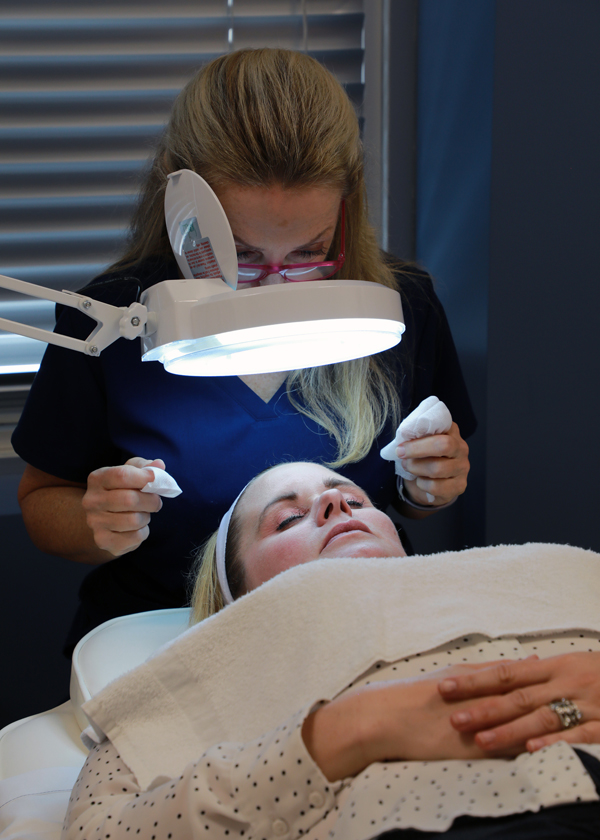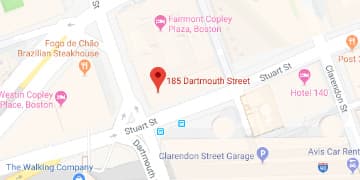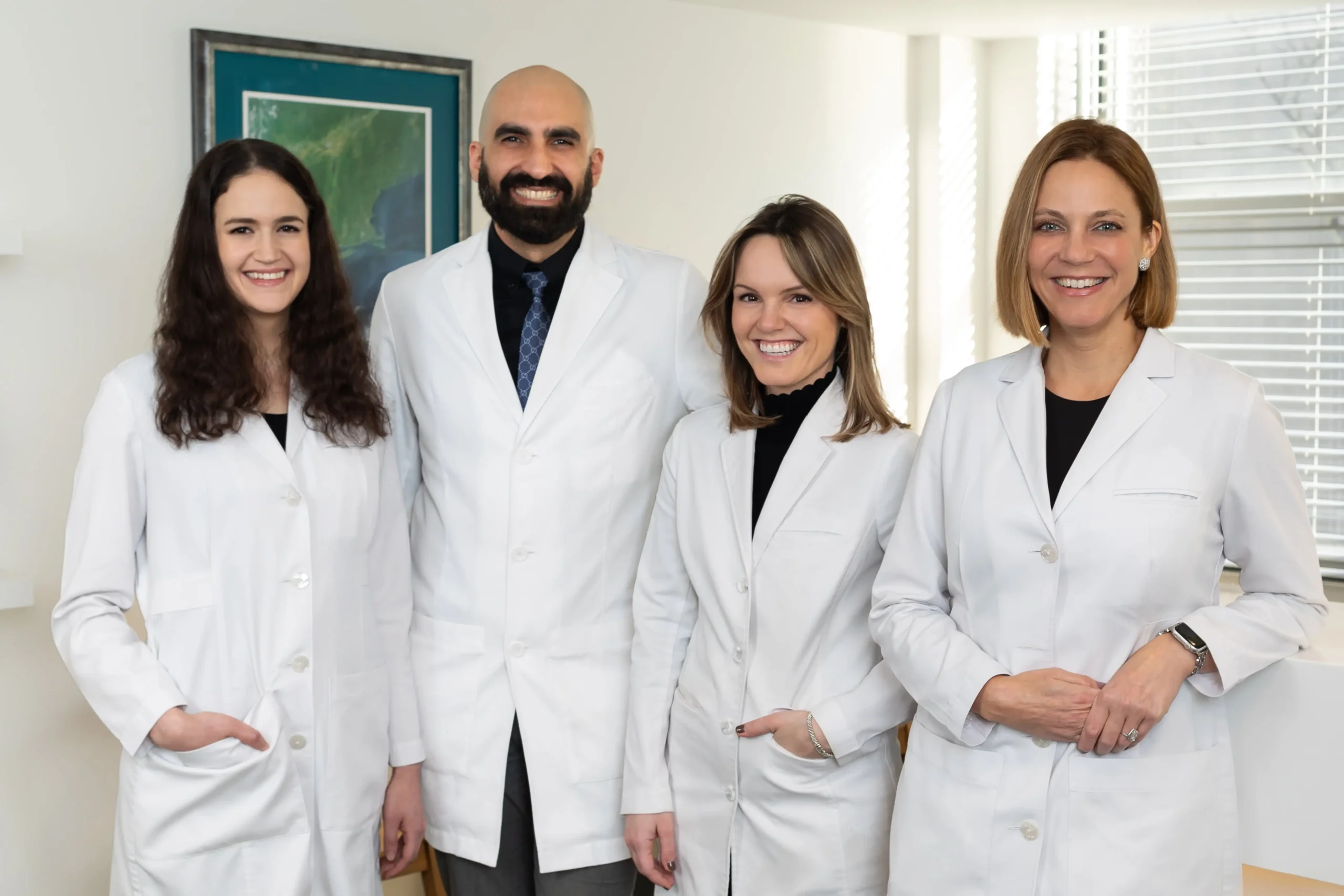Hyperpigmentation Treatment
Jump To
Conveniently located to serve Boston, MA
When melanocyte cells in one area of the skin create more melanin pigment than usual, this results in discoloration. This discoloration is known as hyperpigmentation. Numerous types of hyperpigmentation can occur, including melasma, post-inflammatory hyperpigmentation (PIH), and sunspots (also called lentigines).
At The Dermatology Institute of Boston, conveniently located near Copley Square and the Boston Public Library, our skilled dermatology experts frequently perform hyperpigmentation treatments.
What Causes Hyperpigmentation?
Different types of hyperpigmentation may result from various causes. Most commonly, sun exposure, either recent sun exposure or lifetime cumulative sun exposure may cause hyperpigmentation in the form of sun spots (also known as solar lentigines or liver spots). Genetics and some medications may also cause certain types of hyperpigmentation. Past inflammation in the skin, such as from acne, may induce a type of hyperpigmentation known as post inflammatory hyperpigmentation.
Melasma, a common type of hyperpigmentation, most often seen in women, may be triggered by hormonal fluctuations and sun exposure.
Effective Treatments and Solutions

At The Dermatology Institute of Boston, located at the corner of Dartmouth St. and Stuart St., we provide several effective treatments for dark spots on the face. These include PicoWay laser therapy, chemical peels, and microneedling treatments.
To help prevent darkening of hyperpigmentation, Boston patients can apply SPF 30+ sunscreen daily (even in the Boston winters!), avoid sun overexposure, and wear hats and other protective clothing on sunny days.
PicoWay Laser Treatment for Hyperpigmentation
The FDA-approved PicoWay laser treatment is an excellent spot treatment for brown spots. Its laser energy heats melanin pigment, causing it to break into tiny particles, which are naturally and safely filtered out by the body. This greatly reduces the appearance of hyperpigmentation, providing long-lasting brightening for the skin.
PicoWay is a picosecond laser system, meaning its energy pulses only last for picoseconds (trillionths of a single second). This technology applies light only to the targeted melanin (hyperpigmentation) and prevent damage to surrounding tissues. This makes it safer than traditional laser treatments, greatly reducing tissue injury, discomfort, and downtime.
Unlike many other laser treatments for the face, the PicoWay laser can be used safely on all skin types and all skin tones and colors. It’s quite versatile and can help all Boston patients address hyperpigmentation issues like melasma, sunspots, post-inflammatory hyperpigmentation, freckles, and age spots.
Chemical Peels for Hyperpigmentation
Peels are solutions composed of specially selected acids at various concentrations. These acids soak into the skin tissues, causing dead and damaged skin cells to peel away. This encourages skin-cell turnover, resulting in brighter skin and reduced hyperpigmentation.
Peels can effectively lessen or remove dark spots from the face, including sunspots, melasma, and post-inflammatory hyperpigmentation. Superficial peels treat mild discoloration, while medium and deep peels are best for age spots.
At The Dermatology Institute of Boston, located just blocks from Interstate 90 (the pike), we perform several types of peels to address hyperpigmentation. These include: VI Peels, Jessner’s peels, glycolic peels, and salicylic acid peels.
Microneedling Treatment for Hyperpigmentation
Microneedling treatment involves inserting small, thin microneedles into the skin tissues at various depths and then withdrawing them. This breaks up clustered melanin pigment and triggers an increase in skin-cell turnover. It also creates microchannels in the skin, allowing for deeper penetration of topical skin-brightening agents.
The Dermatology Institute of Boston: The Ideal Choice for Hyperpigmentation Treatment
At The Dermatology Institute of Boston, all of our board-certified dermatologists treat hyperpigmentation in all skin types. We are fortunate to have Dr. Neelam Vashi, MD, FAAD, a world-renowned hyperpigmentation expert, with particular expertise in laser treatments, melasma, and safe treatments for patients of color.

Dr. Vashi was the director of the Boston University Cosmetic and Laser Center and founding director of the Boston University Center for Ethnic Skin. She was an Associate Professor of Dermatology at Boston University’s Chobanian & Avedisian School of Medicine, and at Virginia Commonwealth University, she was an Adjunct Professor of Dermatology.
Dr. Vashi has delivered lectures and presentations at national and international dermatology conferences, meetings, and symposia. She has written four widely respected textbooks, including 2019’s The Dermatology Handbook, and has contributed chapters to several textbooks. Additionally, she has authored numerous peer-reviewed articles in medical journals.
She has contributed cosmetic and medical dermatology expertise to newspapers like The Boston Globe and The Washington Post, magazines like Cosmopolitan and Newsweek, and television networks like ABC, CNBC, and CNN.
Dr. Vashi began her medical training at Northwestern University’s Feinberg School of Medicine in Chicago, IL. After earning her Doctorate, she attended NYU for her residency in the Ronald O. Perelman Department of Dermatology.
She has been a member of several medical societies, including the Women’s Dermatologic Society, the Indian American Medical Association, the American Medical Association, the Skin of Color Society, and the Association of Academic Cosmetic Dermatology.
The Dermatology Institute of Boston has been recognized as one of the best dermatology practices in Boston, and all of our board-certified dermatologists have years of experience. For out-of-state patients, we’re conveniently located near a number of hotels, including the Fairmont Copley Hotel, Raffles Hotel, Boston Marriott and the Sheraton Boston Hotel.
The Hyperpigmentation Treatment Consultation

When ever I come in, the office, staff and exam rooms are so clean and kept up. The staff is warm and efficient. The cloth johnnys are warm and comfy. I love all of you 🥰
– Anne Lorigan, patient
During a consultation for hyperpigmentation treatment at The Dermatology Institute of Boston, you will be able to speak one-on-one with your dermatologist. They will carefully examine your hyperpigmentation issues and ask you about your goals for treatment. They will also ask questions about your medical history, including current medications and supplements, past treatments, allergies, and your skincare routine.
Your dermatologist will tell you about our hyperpigmentation treatment options and will work with you to select your ideal treatment method. They will then go over the details of the treatment process from start to finish, including preparation and aftercare directions. Questions are highly encouraged and are welcome at any time.
The Cost of Hyperpigmentation Treatment
The price of hyperpigmentation treatment in Boston depends on factors like the type of hyperpigmentation being addressed and the chosen treatment modality. Cost can also be impacted by the number of treatment sessions required and the patient’s cosmetic goals.
Contact Our Office to Learn More
Schedule a personalized consultation at The Dermatology Institute of Boston, located near Copley Square, Neiman Marcus and dining options like Sorellina, La Padrona and Oak Long Bar. Contact us for an appointment, where we’ll help you choose your ideal hyperpigmentation treatment and create an effective treatment strategy.









